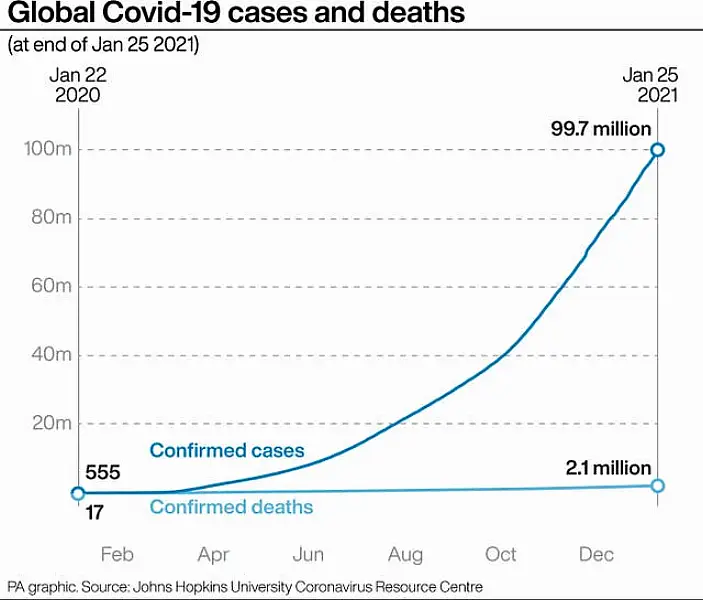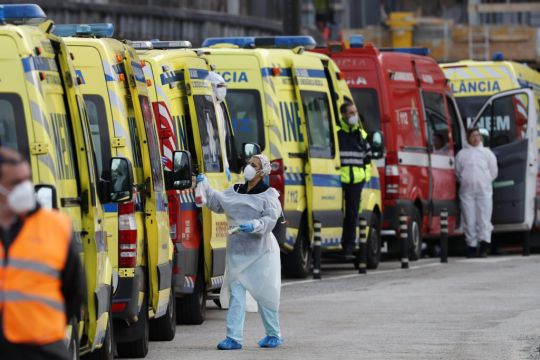The coronavirus pandemic’s spread across Europe is increasingly being powered by an especially contagious virus mutation first detected last year in south-east England, health experts have said.
The threat is prompting governments to introduce harsh new lockdowns and curfews.
In the first week of December, Portugal’s prime minister gave his pandemic-weary people an early Christmas gift: restrictions on gatherings and travel due to Covid-19 would be lifted from December 23-26 so they could spend the holiday season with family and friends.
Soon after those visits, the pandemic quickly got out of hand.
By January 6, Portugal’s number of new daily Covid-19 cases surged past 10,000 for the first time. In mid-January, with alarm bells ringing as each day brought new records of infections and deaths, the government ordered a lockdown for at least a month and a week later shut the country’s schools.

But it was too little, too late. Portugal has for almost a week had the most daily cases and deaths per 100,000 people in the world, according to statistics compiled by Johns Hopkins University.
Outside the country’s overloaded hospitals now, long lines of ambulances wait for hours to deliver their Covid-19 patients.
Portugal’s problems illustrate the risk of letting down pandemic guards when a new, fast-spreading variant is lurking unseen.
Viggo Andreasen, an assistant professor in mathematical epidemiology at Roskilde University, west of Copenhagen, said the new variant is a game-changer.
“On the surface, things may look good but underneath, the (new) variant is looming,” he said. “Everyone in the business knows that there is a new game on its way.”
In Denmark, the variant is threatening to spin the pandemic out of control, despite relative early success in containing the spread of the virus. Prime Minister Mette Frederiksen said this month “it is a race against time” to get people vaccinated and slow the variant’s progress because it is already too widespread to stop.

The National Institute for Public Health and the Environment in the Netherlands last week reported rising cases of the variant and warned it will push higher the number of hospital admissions and deaths.
“There are essentially two separate Covid-19 epidemics: one epidemic involving the ‘old’ variant, in which infections are decreasing, and another epidemic involving the (new) variant, in which infections are increasing,” it said.
The Netherlands went into a tough five-week lockdown in mid-December, closing schools and non-essential businesses as new infections spiked. Prime Minister Mark Rutte extended the lockdown by a further three weeks on January 12, citing concerns about the new variant.
Last week, the Dutch government went a step further and introduced a 9pm to 4.30am curfew, as well as limiting the number of guests people can have at home to one per day.
The discovery of the new variant has prompted other EU countries to stiffen their lockdown measures. Belgium has banned all non-essential travel for residents until March, and France may soon begin a third lockdown if its 12-hour daily curfew does not slow the spread of new infections.
Other mutated versions of the virus have surfaced in Brazil and South Africa.
Meanwhile, the European Union has warned pharmaceutical giants that develop coronavirus vaccines to honour their contractual obligations after slow deliveries of shots from two companies hampered the rollout in several nations.
The bloc had already hit out at AstraZeneca, accusing it of failing to guarantee the delivery of vaccines without a valid explanation, and expressed displeasure over delivery delays from Pfizer-BioNTech last week.
On Tuesday, EU Commission president Ursula von der Leyen told the World Economic Forum: “Europe invested billions to help develop the world‘s first Covid-19 vaccines. To create a truly global common good. And now, the companies must deliver. They must honour their obligations.”







